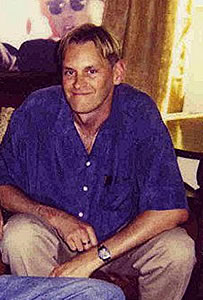De Engelse dichter en schrijver Lewis Carroll werd op 27 januari 1832 in Daresbury. Zie ook mijn blog van 27 januari 2007 en ook mijn blog van 27 januari 2008 en ook mijn blog van 27 januari 2009.
Uit: Alice in Wonderland
„The rabbit-hole went straight on like a tunnel for some way, and then dipped suddenly down, so suddenly that Alice had not a moment to think about stopping herself before she found herself falling down what seemed to be a very deep well.
Either the well was very deep, or she fell very slowly, for she had plenty of time as she went down to look about her, and to wonder what was going to happen next. First, she tried to look down and make out what she was coming to, but it was too dark to see anything; then she looked at the sides of the well, and noticed that they were filled with cupboards and book-shelves: here and there she saw maps and pictures hung upon pegs. She took down a jar from one of the shelves as she passed; it was labelled “ORANGE MARMALADE,” but to her great disappointment it was empty: she did not like to drop the jar for fear of killing somebody underneath, so managed to put it into one of the cupboards as she fell past it.
“Well!” thought Alice to herself. “After such a fall as this, I shall think nothing of tumbling down stairs! How brave they’ll all think me at home! Why, I wouldn’t say anything about it, even if I fell off the top of the house!” (Which was very likely true.)
Down, down, down. Would the fall never come to an end? “I wonder how many miles I’ve fallen by this time?” she said aloud. “I must be getting somewhere near the centre of the earth. Let me see: that would be four thousand miles down. I think-” (for, you see, Alice had learnt several things of this sort in her lessons in the schoolroom, and though this was not a very good opportunity for showing off her knowledge, as there was no one to listen to her, still it was good practice to say it over) “-yes, that’s about the right distance-but then I wonder what Latitude or Longitude I’ve got to?” (Alice had no idea what Latitude was, or Longitude either, but thought they were nice grand words to say.)“

Lewis Carroll (27 januari 1832 – 14 januari 1898)
De Duitse schrijver Benjamin von Stuckrad-Barre werd op 27 januari 1975 in Bremen geboren. Zie ook mijn blog van 27 januari 2007 en ook mijn blog van 27 januari 2008 en ook mijn blog van 27 januari 2009.
Uit: Soloalbum
“Auf Fotos sehe ich immer scheiße aus. Dies zu erklären ist nicht allzu vertrackt: Das kommt daher, weil ich ja nun mal scheiße aussehe, ganz einfach. Denn Fotos sind Fotos, die bilden den Ist-Zustand ab, da gibt es nichts dran zu rütteln, Pech gehabt, Arschloch. Natürlich gibt’s es „nicht fotogen, nicht mein Tag, ach guck – noch mit der doofen Frisur“ und solche Ausreden. Aber die braucht man ja nicht mehr sich selbst, schon lange nicht mehr, bloß für die allgegenwärtigen Fotosammler, die dauernd alles abziehen und verdoppeln wollen, weil sie ihr jämmerliches Dasein gar nicht fassen können, so toll finden sie diese Einfalt, und das wollen sie minuziös festgehalten wissen, damit sie dann eine Woche später schon da sitzen können wie der Opa mit seinen Kriegstagebuchnotizen. Vorzeigen zu können, wie aufregend und pulsierend die Soße aus Pausch
alurlaub, Wohngemeinschaft, Elterngeld und neuer Hose (neuer Freundin, neuer Wohnung, alter Scheiße) ist, das ist diesen Pennern alles. Ich hebe überhaupt keine Fotos auf. Die wenigen schönen, die mit den Frauen, musste ich ja dann immer verbrennen, weil man sich ja nun mal so kindisch verhält, wie es gerade geht, wenn mal wieder alles den Bach runter gegangen ist.“

Benjamin von Stuckrad-Barre (Bremen, 27 januari 1975)
De Franse schrijfster Eliette Abécassis werd geboren op 27 januari 1969 in Straatsburg. Zie ook mijn blog van 27 januari 2009.
Uit: La répudiée
“Tous les mois, c’est la même chose. Je pleure. Je soupire. J’attends. Que le linge au-dessous de moi ne soit point taché de rouge. Et tous les mois, mon ventre me fait mal. Le sang s’échappe, je saigne, je prie, je pleure. Mes larmes mouillent le mur occidental. Telle une brebis abandonnée, ainsi j’erre dans les rues. Mes paupières tremblent, mes jambes vacillent, mes yeux brillent de douleur. Je regarde autour de moi, je ne vois personne pour m’aider.
Ma mère, qui est la gardienne du mikvé, le bain rituel, a honte de ma stérilité. Chaque mois, je viens me tremper dans l’eau de pluie car, à la fin des sept jours sans tache, la femme doit s’immerger dans le mikvé à la nuit tombée, après que trois étoiles ont été visibles.
Il me semble que j’expie quelque chose. Je souffre, je vomis, je me traîne par terre, je cogne ma tête contre les murs. Toute la journée, je reste couchée. Nathan a trouvé un nom pour les jours impurs. Il me demande quand sera finie “ma maladie”. Il n’a pas pas tort. L’impureté mensuelle, c’est la maladie de la femme stérile.
Mais on ne peut devenir pure que parce que l’on est impure. C’est pourquoi la femme, chaque mois, s’élève en se purifiant. Quand tout est fini, je me rends au bain rituel, je me déshabille, et, aidée par ma mère Hanna, je plonge dans le bassin d’eau froide, tête comprise : c’est une naissance.
– Toujours rien ? demande ma mère.
– Toujours rien.
– Cela va bientôt faire dix ans.
– Je sais. S’il le veut, Nathan peut me répudier.”

Eliette Abécassis (Straatsburg, 27 januarri 1969)
De Amerikaanse schrijver James Grippando werd geboren op 27 januari 1958 in Waukegan, Illinois. Zie ook mijn blog van 27 januari 2008 en ook mijn blog van 27 januari 2009.
Uit: Leapholes
„Ryan Coolidge did not want to go to prison.
He’d been going to prison every Saturday for the past eleven months. Without fail, his mother would wake him, she’d put him in the car, and off they’d go. He didn’t like the smell of prison, didn’t like the feel of prison. He didn’t like the drab beige walls, the cold concrete floors, the countless pairs of dark, soulless eyes that stared out from between iron prison bars. He didn’t like anything about prison.
The thing he liked least of all was visiting his father there.
“Do we have to go, Mom?” Ryan was holding up his head with his hands, elbows on the kitchen table, a soggy raft of cornflakes floating in the bowl of milk before him.
“You should want to go.”
“I don’t.” He dropped a piece of toast on the floor. His Golden Retriever pounced on it like a half-starved wolf. It was gone in one bite, and then Sam laid his huge head in Ryan’s lap, begging for more. Sam was a smart and beautiful purebred, but his table manners had gone right out the door with Ryan’s dad.
“A boy should want to see his father,” said Dr. Coolidge.
“I don’t.”
“Your father loves you.”
“Well, I don’t love him.”
“Never say that about your father. Never. Do you hear me?”
The dog sighed, as if wondering if that next piece of toast would ever drop. Ryan stroked the back of Sam’s neck.“

James Grippando (Waukegan, 27 januari 1958)
De Brits-Amerikaanse schrijver Alexander Stuart werd geboren op 27 januari 1955 in Brighton. In de jaren negentig verhuisde hij naar Miami Beach waar hij screenwriting doceerde aan de University of Miami. In 2006 werd hij Amerikaans staatsburger. Zijn meest opzienbarende roman was The War Zone uit 1989, waarin hij de dood van zijn zoon verwerkte, maar dat ook het verhaal was van een familie die verscheurd wordt door incest. Het boek werd in 1999 verfilmd door Tim Roth. Ander werk van hem: Tribes, Life On Mars en Five And A Half Times Three.
Uit: Life on Mars
“Jesus,” I say, stunned by the anger and passion I recognize from my own flailing emotions during my son’s, Joe’s, struggle with cancer. I look at Brian, sitting there by the highway in front of this nowhere motel. “Maybe there is life in Tampa, after all?”
Brian, who has read the whole thing with a high degree of passion himself, stares at it again and says, “It’s incredible! ‘Those people, those poor people….Them and us, us means you.'” He slams the newspaper down in his lap, turns to me and grins with a terrifying, twisted intensity. “Happy trails, you fuckers.”
I take the paper from him and read the poem again, the morning sun scorching my neck, a strange buzz of birdsong and rocket-powered traffic assaulting my brain . “John Imboden,” I say , “can write!”
“And he’s right about the red ribbon bullshit,”declares Brian. “They’ve tried to make AIDS just another fucking charity bonanza.”‘ His eyes burn with the ferocity of John Imboden’s words; among his friends on South Beach, Brian has seen plenty of the reality of AIDS. He grabs the paper back and reads: “‘We are living in hell and there are plenty of seats on the meat wagon…'”
I could not speak to John Imboden that day, wherever we were outside Tarpon Springs, but I tracked him down later by phone, and with all the invisibility and anonymity and static and false silence afforded by AT&T’s long distance lines between Miami and Tampa, we talked about his poetry and his life, about AIDS and the prospect of death.
I feel guilty–it was his body and soul we were discussing, but I had been there, as much as anyone can who does not have AIDS themselves. I had lived through two years, with Joe Buffalo and his mother, of spending months in hospital and out: two years of living with the possibility of death every day and every night; of lying next to Joe in bed and smelling the fevered salt sweat in his hair and begging some greater force–whatever was out there–that we might not lose the child we loved above anyone or anything in the world; two years of making the most painful and horrifying choices for his body, not our own.“

Alexander Stuart (Brighton, 27 januari 1955)
Zie voor nog meer schrijvers van de 27e januari ook mijn twee vorige blogs van vandaag.





